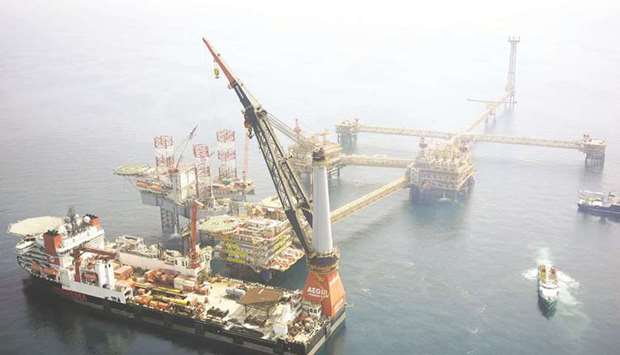Qatar's $29bn North Field Expansion (NFE) plan to boost LNG output by over 40% over the next several years bodes well for the future of its energy sector, researcher FocusEconomics said in its latest country report.
Last month, Qatar Petroleum (QP) took the final investment decision for developing the $28.75bn North Field East Project (NFE), the world’s largest LNG project, which will raise Qatar’s LNG production capacity from 77mn tonnes per year (mtpy) to 110 mtpy by 2025.
The project will also produce condensate, LPG, ethane, sulphur and helium.
It is expected to start production in the fourth quarter of 2025 and total production will reach about 1.4mn barrels oil equivalent per day.
The NFE project will be one of the energy industry’s largest investments in the past few years, in addition to being the largest LNG capacity addition ever, and the most competitive LNG project in the world.
This project will generate substantial revenues for Qatar and will have significant benefits to all sectors of the Qatari economy during the construction phase and beyond.
FocusEconomics also sees Qatar’s recent LNG supply deals with Bangladesh and Pakistan positive for Qatar’s energy sector.
Last month, QP entered into a new long-term sale and purchase agreement (SPA) with Pakistan State Oil Company (PSO) for the supply of up to 3 mtpy of LNG to Pakistan.
Again in February, QP entered into an SPA with Vitol for the supply of 1.25mtpy of liquefied natural gas (LNG) to Vitol’s final customers in Bangladesh.
After a softer decline in economic activity in Q3, 2020 (third quarter) thanks to a notably milder contraction in the non-energy sector, signs for Q4 were mixed, FocusEconomics said.
While private-sector Purchasing Managers' Index (PMI) data suggested the non-energy sector was robust due to low Covid-19 cases and the lifting of restrictions in September, industrial production data pointed to a large contraction in the energy sector.
Turning to 2021, PMI readings for January and February suggest domestic activity remained fairly healthy, although the tightening of restrictions from February following a second wave of Covid-19 cases could be tempering momentum towards the end of the quarter.
FocusEconomics sees Qatar’s economy set to expand this year on stronger domestic and foreign demand.
Investment in the energy sector and easing tensions with Gulf neighbours should also provide support. However, volatile commodity prices, the potential extension of restrictions and possible delays in the Covid-19 vaccine rollout pose downside risks.
FocusEconomics panellists see a 2.8% rise in GDP in 2021, which is unchanged from last month’s forecast, before growth of 3.5% in 2022.
Consumer prices fell 1.3% in annual terms in January, moderating from the 3.4% decline in December. Prices are seen rising this year on higher food and energy costs, recovering activity and a supportive base effect.
FocusEconomics panellists see consumer prices rising 0.8% in 2021, which is down 0.1 percentage points from last month’s forecast. In 2022, the panel sees inflation averaging 2.3%.
Last month, Qatar Petroleum (QP) took the final investment decision for developing the $28.75bn North Field East Project (NFE), the world’s largest LNG project, which will raise Qatar’s LNG production capacity from 77mn tonnes per year (mtpy) to 110 mtpy by 2025.
The project will also produce condensate, LPG, ethane, sulphur and helium.
It is expected to start production in the fourth quarter of 2025 and total production will reach about 1.4mn barrels oil equivalent per day.
The NFE project will be one of the energy industry’s largest investments in the past few years, in addition to being the largest LNG capacity addition ever, and the most competitive LNG project in the world.
This project will generate substantial revenues for Qatar and will have significant benefits to all sectors of the Qatari economy during the construction phase and beyond.
FocusEconomics also sees Qatar’s recent LNG supply deals with Bangladesh and Pakistan positive for Qatar’s energy sector.
Last month, QP entered into a new long-term sale and purchase agreement (SPA) with Pakistan State Oil Company (PSO) for the supply of up to 3 mtpy of LNG to Pakistan.
Again in February, QP entered into an SPA with Vitol for the supply of 1.25mtpy of liquefied natural gas (LNG) to Vitol’s final customers in Bangladesh.
After a softer decline in economic activity in Q3, 2020 (third quarter) thanks to a notably milder contraction in the non-energy sector, signs for Q4 were mixed, FocusEconomics said.
While private-sector Purchasing Managers' Index (PMI) data suggested the non-energy sector was robust due to low Covid-19 cases and the lifting of restrictions in September, industrial production data pointed to a large contraction in the energy sector.
Turning to 2021, PMI readings for January and February suggest domestic activity remained fairly healthy, although the tightening of restrictions from February following a second wave of Covid-19 cases could be tempering momentum towards the end of the quarter.
FocusEconomics sees Qatar’s economy set to expand this year on stronger domestic and foreign demand.
Investment in the energy sector and easing tensions with Gulf neighbours should also provide support. However, volatile commodity prices, the potential extension of restrictions and possible delays in the Covid-19 vaccine rollout pose downside risks.
FocusEconomics panellists see a 2.8% rise in GDP in 2021, which is unchanged from last month’s forecast, before growth of 3.5% in 2022.
Consumer prices fell 1.3% in annual terms in January, moderating from the 3.4% decline in December. Prices are seen rising this year on higher food and energy costs, recovering activity and a supportive base effect.
FocusEconomics panellists see consumer prices rising 0.8% in 2021, which is down 0.1 percentage points from last month’s forecast. In 2022, the panel sees inflation averaging 2.3%.


